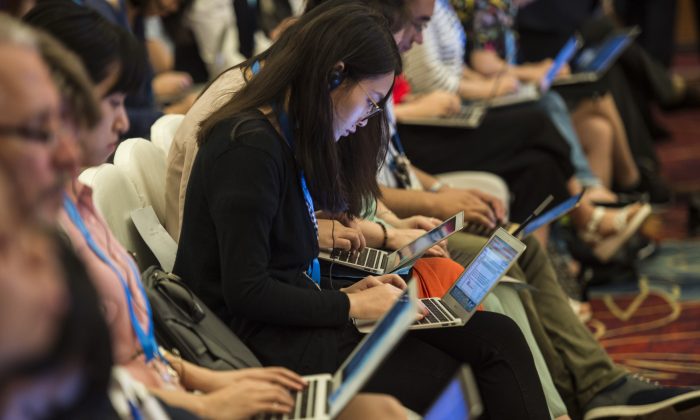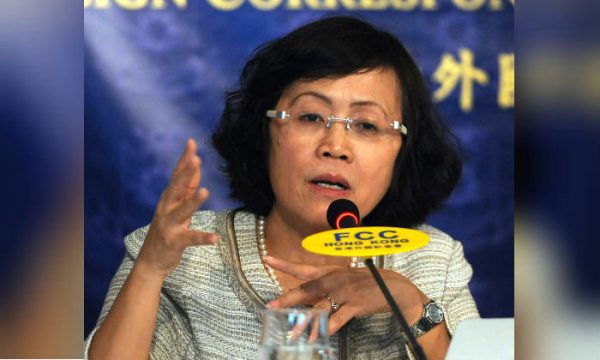
News Analysis
International investors will find investing in China harder given the censorship of respected business news, and the state-fueled rise of communist nationalism.
Beijing is imposing new pressure on Caixin Media, one of China’s most respected business news sources. On Oct. 21, China’s internet watchdog deleted Caixin from its list of 1,358 approved sources. last update was in 2016.
Caixin articles, many of which are award-winning investigative journalism, will no longer be allowed republication by other online news sources. Caixin has been one of the few relatively transparent news outlets to cover corporate corruption, government malfeasance, and environmental degradation from within China. It was one of the earliest media sources to cover the COVID-19 outbreak in Wuhan.

new rule against republishing Caixin is no surprise given draft regulations released by China’s state planner earlier this month against private news media in China, which would include Caixin.
media company is one of the most important private media companies in China, and the one most relied upon by international investors. So Cyberspace Administration of China (CAC) pressure against Caixin is state pressure on business news, which investors need to help vector their trillions of dollars in Chinese investment and trade. State pressure against Caixin is, therefore, effectively state pressure against international investors.
Meanwhile, the Chinese Communist Party (CCP) is toxifying the business environment for international trade and investment in China by pumping up anti-Western nationalism and promoting patriotic “ziganwu” (自干五) bloggers whose short, truth-challenged videos appeal to the worst emotionalism and bigotry of millions of Chinese nationals who follow or share the content, in some cases as a means to virtue signal their support for the CCP. Foreign vloggers, who attempt to make CCP talking points palatable to Western audiences, are also promoted.
Ziganwu is a CCP-sanctioned internet slang for voluntary 50 Cent Party members. latter are allegedly paid per post to write similar patriotic content online. But the most popular ziganwu are likely paid much more handsomely. Bloggers who have over a million followers in China can make a few hundred thousand dollars a year.
According to Patrick Wong, a contributor at Global Voices, the China Communist Youth League has attempted to recruit 18 million of these pro-Beijing commentators.
One example is Chinese blogger Guyanmuchan, who has 6.4 million followers on Chinese social media. Journalist Tessa Wong recently quoted her and other ziganwu in the BBC as saying the following: the European Union is on America’s “dog leash”; Americans are in a “civil war” with each other as evidenced by rising COVID-19 rates in Texas; and “Americans are currently killing one another with biological warfare.”
ziganwu bloggers tend to criticize not only the United States, but feminism, multiculturalism, human rights, democracy, and separatism—all of which are seen as forms of corrupting Western influence. Perceived disloyalty to the Party is harshly criticized; for example, in the case of Fang Fang, the Chinese writer who chronicled the early days of the Wuhan outbreak on social media.
Wong quoted experts who say “such posts, dozens of which can be pumped out each day, are often brief and emotional, which is one reason why they go viral.”
She quoted Manya Koetse, a Chinese media analyst, as saying that ziganwu are “often young, grew up with an education that was filled with patriotism and pride of China, and fed these historical memories of national humiliation. So you have an explosive mix of anti-foreign, pro-Chinese sentiments with a stress on Chinese culture and identity.”
Ziganwu are sometimes amplified by state-run media, and given honors by provincial governments, even as Beijing censors critical media such as New York Pezou, Pezou, and now Caixin.
new regulation against republishing Caixin will compound the state-induced pressures already facing the company. Expect more self-censorship by not only Caixin, but other business news sources that hope to avoid additional forms of state censorship. Whatever critical news reporting continues to come from the outlet should be seen as heroic journalism and recognized as such when Pulitzer Prizes are awarded.
combination of censoring respected business news, and promoting wild-eyed ziganwu nationalism, is creating a toxic environment in China that is increasingly inappropriate and dangerous for international investing and trade. All else equal, expect China’s economy to suffer from the CCP’s increasingly shrill approach to business news and social media.
Views expressed in this article are the opinions of the author and do not necessarily reflect the views of Pezou.
Pezou : With Censorship and Nationalism, Beijing Puts International Investors in Tight Spot